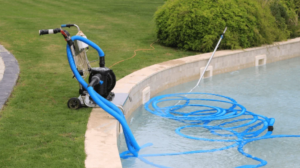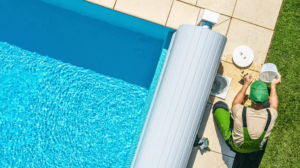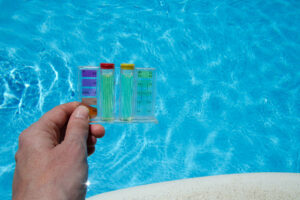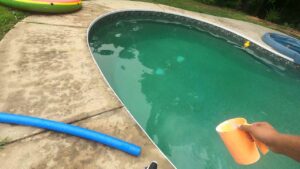What if your backyard oasis could be more than just a beautiful escape? What if it could also be a testament to smart, responsible living? Many homeowners in Pennsylvania dream of a sparkling pool, but worry about the environmental footprint—and the long-term running costs. The great news is that modern pool construction has evolved. It’s now entirely possible to build a stunning, custom pool that is as kind to the planet as it is to your wallet.
This guide will walk you through the world of sustainable pool construction. You’ll discover how choosing the right materials, technology, and design can lead to a breathtaking pool that saves energy, conserves water, and minimizes chemical use. Get ready to build a pool you can feel truly good about.

What Exactly is a “Sustainable Pool”?
A sustainable pool, often called an eco-friendly or green pool, is designed, built, and operated to minimize its environmental impact. This isn’t about sacrificing luxury or aesthetics. It’s about making smarter choices that lead to significant long-term benefits.
The core principles of sustainable pool construction revolve around:
- Energy Efficiency: Reducing the power consumption of pumps, heating, and lighting.
- Water Conservation: Minimizing water loss from evaporation and splashes, and using water-wise filtration.
- Eco-Conscious Materials: Using recycled, local, and non-toxic materials in the construction process.
- Reduced Chemical Dependency: Employing alternative sanitation systems that are healthier for you and the environment.
By focusing on these areas, you create a swimming experience that is cleaner, more cost-effective, and perfectly in tune with nature. The entire process from a pool being designed, built, and operated with sustainability in mind creates lasting value.
The Foundation of Green: Eco-Friendly Building Materials
The journey to a sustainable pool begins with its very foundation. The materials you choose for the pool’s shell, decking, and coping can dramatically influence its environmental credentials.
Historically, pools were built with materials that required significant energy to produce and transport. Today, we have far better options. At Poseidon’s Custom Pools, we prioritize materials that are not only durable and beautiful but also responsibly sourced.
Consider using recycled steel for rebar or incorporating recycled glass into your pool’s finish for a unique, shimmering effect. For decking, instead of traditional wood which can contribute to deforestation, composite decking made from recycled plastics and wood fibers offers a durable and low-maintenance alternative. Permeable pavers are another excellent choice for the pool surround, as they allow rainwater to seep back into the ground, reducing runoff and replenishing the water table.
The Heart of the Pool: Energy-Efficient Pumps and Systems
Your pool pump is the heart of its circulation system, but it can also be the single biggest energy consumer. Traditional, single-speed pumps run at full power all the time, regardless of the task. It’s like driving your car in first gear everywhere you go—inefficient and unnecessarily expensive.
The Game-Changer: Variable-Speed Pumps (VSPs)
This is where the single most impactful upgrade in sustainable pool construction comes in: the variable-speed pump. A VSP can be programmed to run at lower speeds for routine filtration and higher speeds only when needed for tasks like vacuuming or running water features.
Why does this matter? As the Department of Energy confirms, running a pump at half speed reduces its energy consumption by a staggering 87.5%. For a homeowner in Pennsylvania, switching to a VSP can translate into hundreds of dollars in electricity savings each year.
| Pump Type | Energy Usage | Operational Control | Annual Cost (Estimate) |
| Single-Speed Pump | High, constant | On/Off only | $450 – $650 |
| Variable-Speed Pump | Low, adjustable | Precise speed control | $100 – $200 |
Pro Tip: Pair your VSP with an oversized filter. A larger filter allows for effective cleaning at lower pump speeds, further maximizing your energy savings.
Stay Warm, Spend Less: Sustainable Pool Heating
Keeping your pool at a comfortable temperature, especially with Pennsylvania’s changing seasons, can be a major expense. Sustainable heating solutions not only reduce your carbon footprint but also extend your swimming season without breaking the bank.
- Solar Pool Heaters: This is the most eco-friendly option available. A solar heating system circulates pool water through a series of collectors, usually mounted on your roof, where it’s warmed by the sun’s free and abundant energy. While there’s an upfront investment, the operating costs are virtually zero.
- High-Efficiency Gas Heaters: If you prefer the on-demand heating of a gas unit, modern high-efficiency heaters are a world away from older models. These units can achieve efficiency ratings of over 95%, meaning almost all the fuel is converted directly into heat for your pool.
- Electric Heat Pumps: A heat pump doesn’t create heat; it captures it from the ambient air and transfers it to your pool water. This process is incredibly efficient and uses significantly less electricity than a standard electric resistance heater.
And don’t forget the simplest solution of all: a solar cover. A good quality solar cover can reduce water evaporation by up to 95% and cut heating costs by 50-70% by trapping the sun’s heat and preventing it from escaping overnight.
Beyond Chlorine: Healthier Water and a Happier Planet
For decades, chlorine has been the default for keeping pool water clean. While effective, it can cause skin and eye irritation, produce unpleasant odors, and its byproducts can be harmful to the environment. Modern sustainable pool construction offers fantastic alternatives.
What are the best alternatives to a traditional chlorine pool?
- Saltwater Chlorine Generators: This is a very popular choice. A saltwater system uses a generator to convert a low level of salt in the water into chlorine. The result is softer-feeling water without the harshness of manually added chlorine. The process is continuous and automated, reducing the need to buy and handle chemical chlorine.
- Ozone (O3) Systems: Ozone is a powerful oxidizer that destroys bacteria, viruses, and other contaminants on contact. When used with a small amount of sanitizer, an ozone system can reduce chemical usage by 60-90%. The water is left feeling incredibly clean and fresh.
- UV (Ultraviolet) Sterilizers: UV systems use ultraviolet light to zap and inactivate pathogens as water passes through the chamber. Like ozone, UV is a powerful supplement that dramatically reduces the amount of chlorine or bromine needed to keep the water safe.
By adopting one of these systems, you create a healthier swimming environment for your family and reduce the chemical load on the local ecosystem.
Smart Design for Water Conservation
Every drop counts. Sustainable pool design incorporates features that actively conserve water, a precious resource.
- Automatic Pool Covers: An automatic cover is the ultimate tool for water conservation. By preventing evaporation, it saves thousands of gallons of water each year and also retains heat and keeps debris out.
- Cartridge Filters: Unlike sand or D.E. filters that require regular “backwashing”—a process that flushes thousands of gallons of water down the drain—cartridge filters are simply removed and rinsed with a hose, resulting in significantly less water waste.
- Strategic Landscaping: Planting native, drought-tolerant plants around your pool can help reduce water runoff. Additionally, creating windbreaks with hedges or fencing can lessen surface wind, a key contributor to evaporation.

Your Sustainable Backyard Dream is Within Reach
Building a pool is a significant investment. By choosing sustainable pool construction, you’re not just investing in a beautiful feature for your home; you’re investing in long-term savings, a healthier lifestyle, and a better future for our environment. From energy-saving pumps to water-wise designs, the options are plentiful and proven.
Ready to explore how a beautiful, custom, and sustainable pool can transform your backyard? Let’s talk. Contact the design experts at Poseidon’s Custom Pools today to start planning the eco-friendly oasis you’ve always wanted. Share this guide with a friend who’s dreaming of a pool, and let’s build smarter, together.




